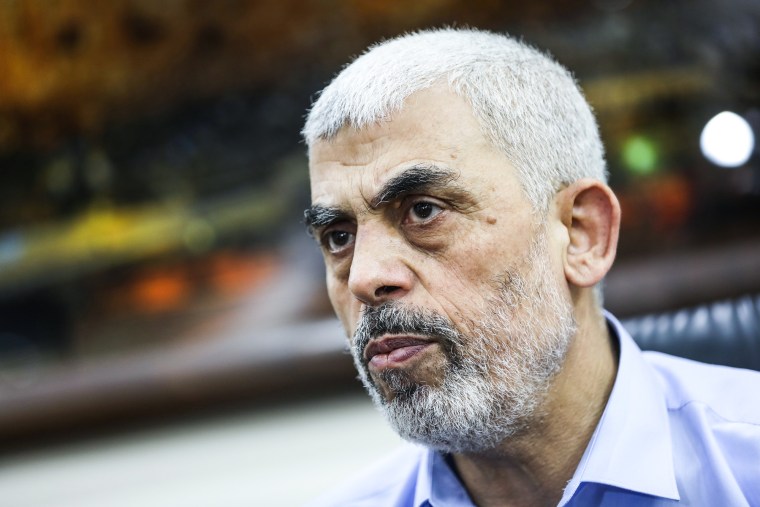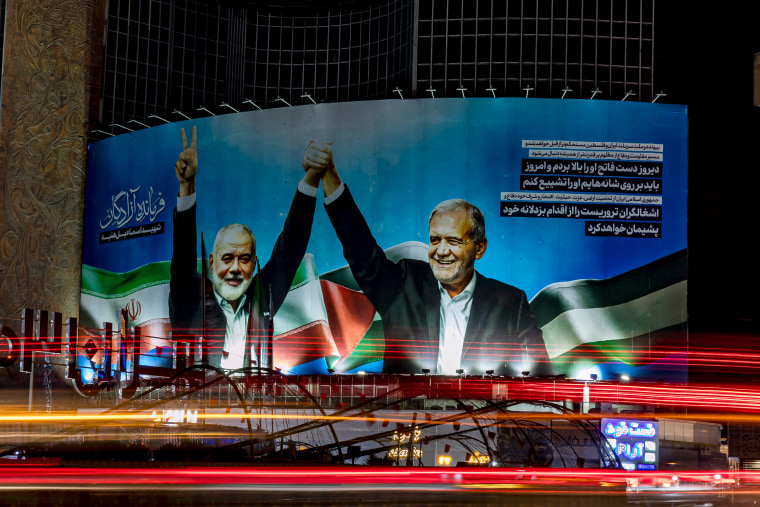DOHA, Qatar — The day after Iran launched strikes against Israel, a senior Hamas official told NBC News on Wednesday that the militant group has been let down by its Arab neighbors in the wake of the Oct. 7 terror attacks.
In an interview in Qatar’s capital, Doha, where part of the group’s political wing is based, Dr. Basem Naim said Hamas was “disappointed by the reaction of the region, of the countries in the region.” Although some of them had supported the group politically and financially, he said Iran “was maybe the only country regarding supporting the resistance.”
He added that Yahya Sinwar, the alleged mastermind of the Oct. 7 attacks, is still alive and communicating with both Hamas’ leadership and his forces on the ground.
Iran’s Revolutionary Guard Corps said in a statement that Wednesday’s strikes on Israel were a response to the death of Hezbollah leader Hassan Nasrallah in an Israeli airstrike last week and the killing of Hamas’ political leader in Tehran.

Ismail Haniyeh was killed in an explosion at his residence in the Iranian capital shortly after he participated in the inauguration ceremony of President Masoud Pezeshkian. Israel, which was blamed for the strike that also killed Haniyeh’s bodyguard, has not said whether it was behind the blast. Israel rarely claims responsibility for such acts.
Pezeshkian traveled to Doha on Wednesday for bilateral talks with the Qatari government. He is also set to attend a summit of the Asia Cooperation Dialogue.
“We also want security and peace. It was Israel that assassinated Haniyeh in Tehran,” Pezeshkian was quoted saying on his arrival in Qatar by Iran’s Student News Network. “Europeans and the U.S. said if we do not act, there will be peace in Gaza in one week. We waited for them to have peace but they increased their killing.”

Naim, who trained as a physician before going on to serve as Gaza’s health minister and later minister for sports, said he did not know if Pezeshkian would meet with Hamas representatives while he was in the country. He said that Iran was “an independent state” with its “own interests.” He added that Iran was “calculating very well what to do and what not to do.”
Sinwar, who took over as Hamas’ political leader after Haniyeh’s death, was “still alive” and “still in control” of the militant group, regularly communicating with its members in the Gaza Strip and further afield, he said.
Sinwar was described as a “dead man walking” by the Israeli military in the immediate aftermath of the Oct. 7 attacks, which he was accused of both planning and overseeing.
In the deadliest day in Israel’s history, more than 1,200 people were killed and around 240 people taken hostage. Israel’s military offensive in the Gaza Strip since then has killed more than 41,000 people, according to health officials in the enclave.
But as the first anniversary of those attacks approached, the elusive leader has managed to stay one step ahead of Israel’s military and intelligence services, likely staying on the move and changing locations to avoid detection in the maze of tunnels below Gaza.
The 61-year-old was allegedly last seen in a 42-second clip filmed three days after the attack that showed him and his family fleeing into a tunnel in southern Gaza, according to the Israeli military.
Naim also insisted that Mohammed Deif, head of Al-Qassam Brigades, Hamas’ military wing, was still alive. Israel announced his death in July.
Israel, Naim said, could “kill this leader or the other leader, or attack somewhere here or there, but you don’t solve the problem that there is a people and occupation who are looking for their freedom and dignity and independence.”
The vast majority of Palestinians still believed in “their right to fight, to resist, to struggle for their freedom and dignity,” he said.
He added that Hamas’ current leadership, including himself, “are aware that they might pay a very high price, including their own life.”






